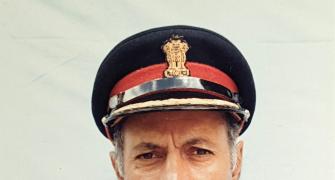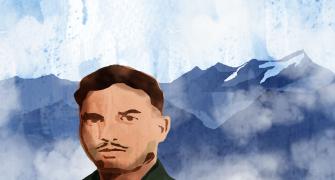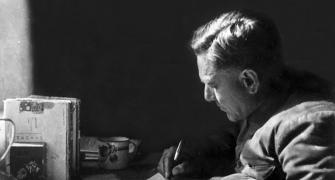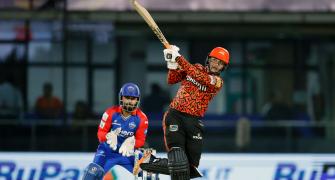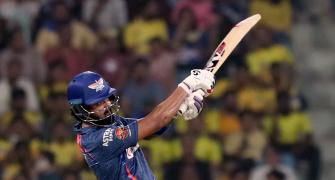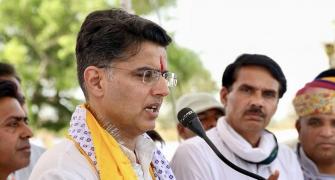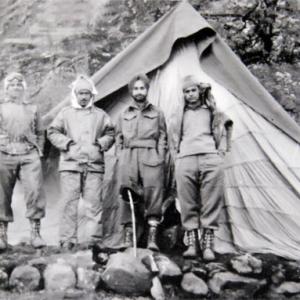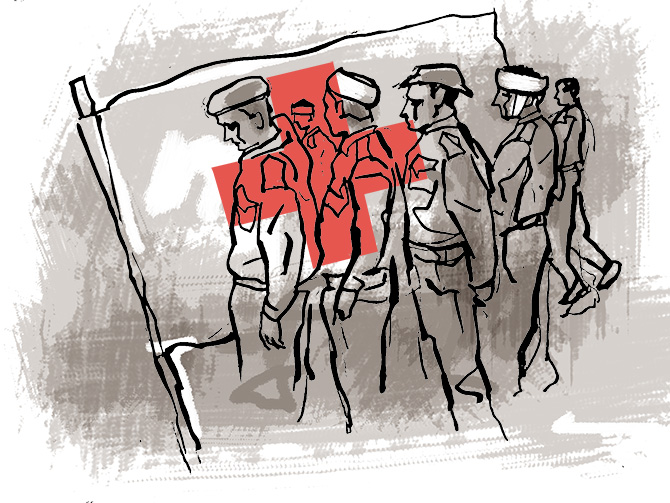At this time, sixty years ago, Brigadier John Parshuram Dalvi and his men were captured as prisoners of war by the Chinese during the 1962 War.
The men led by him fought against incredible odds, outnumbered 20:1.
Brigadier Dalvi served seven months as a PoW in Tibet.
His son Michael Dalvi, 77, has preserved his father's memory and the story of the gallant men of the 7th Infantry Brigade with honour.

As you step in through the front door, the eyes are drawn to portraits of the chiefs of the Indian Army that line the wall in chronological order.
On the outskirts of Dehradun in the middle of a forest, Mike's Forest Retreat is easily one of the best museums of India's military history.
It is one man's mission to honour his father, Brigadier John Parshuram Dalvi, a towering hero of the 1962 War who served as a Chinese prisoner of war for seven months in Tibet after the Battle of Namka Chu in NEFA (now Arunachal Pradesh), sixty years ago.
If not for Brigadier Dalvi, we would not have known what actually happened when 1,000 Indian soldiers of the 7 Infantry Brigade were ordered by the army's higher command to fight 20,000 Chinese troops without providing them the means to defend themselves.

The unique resort pays tribute to heroes and famous battles of the Indian Army. It is a painstaking labour of love by Brigadier Dalvi's son Michael Dalvi, a former Ranji Trophy cricketer and a raconteur par excellence who says the 'fauj' is in his blood.
Brigadier Dalvi's younger brother Colonel Jai Dalvi also served in the Indian Army.
A panel along the wall gives details, maps and pictures of the 1962 War, the Battle of Namka Chu, its harsh terrain at 18,000 feet, PoW camps in Tibet and the brave men who fought and died against all odds in a war that India lost due to inept political and higher military leadership, but where its steadfast soldiers displayed exceptional courage despite resource constraints that severely limited India's war waging capability.
Indian troops were grossly out-numbered, out-weaponed, underclothed and underfed as they attempted to defend a tactically indefensible position without necessary fire support, ammunition or supply lines in Namka Chu. The brigade was deployed across 12-miles where the distance from one end to the other was five days on foot! Moreover, the Chinese had occupied all the dominating heights near Namka Chu river.

'The battalions could not have tried harder or fought more gallantly,' Brigadier Dalvi wrote in his book The Himalayan Blunder.
'The Gorkhas, the Rajputs, the Sikhs, the Dogras, the Bengalis, the Muslims from the Grenadier Regiment, the Ahirs, the South Indian signallers and others from the four corners of India had nothing to sustain them but regimental pride. They had done what they did because they were soldiers. For no man can do more than give his life for his country,' Brigadier Dalvi noted, his anguish palpable through every word in his book.
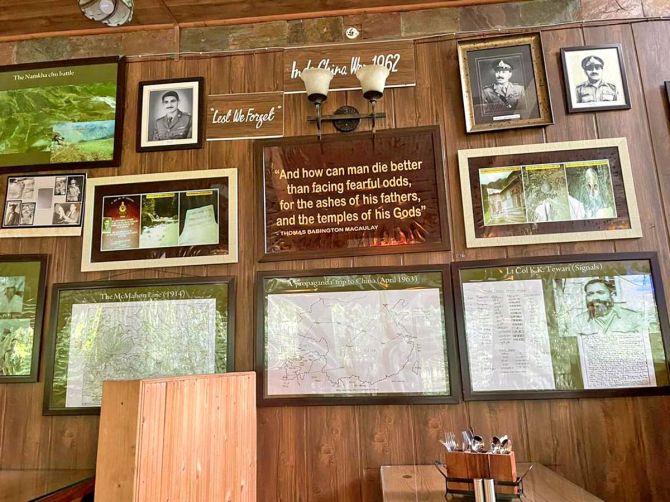
Brigadier John Dalvi's framed black and white picture hangs above two swords. Alongside is a tribute written by Michael Dalvi to his father -- a quintessential army man who joined the army during the Second World War and served till after the 1965 War.
Michael -- who was a teenager studying at the Doon School during the 1962 War - remembers the dates, names, places, officers, incidents that marked his father's distinguished military career with a razor sharp memory.
From his father's IC number 739 that he got at his commissioning in 1941, he takes you through his eventful military career with easy alacrity, interspersed with feelings of pride and pain.
It is like listening to a story of a different time of a different breed of military men. Of a soldier who fought in the raw in the rugged North West Frontier Province, in the jungles of Burma in World War II and at treacherous heights of NEFA (Arunachal Pradesh).

"There were two Brigadier Dalvis -- one was up to 1962, and another after '62 when he became very bitter," says Michael Dalvi, sitting in one of the rooms of the resort with a large window overlooking an aviary and the forest in the distance.
He called his father 'sir' till his dying day. The brigadier was a disciplinarian, and encouraged his son to play cricket. He had suspended a rope with a cricket ball so that Michael could practise his shots.
"I never saw him in chappals, he was always well-dressed. He played and enjoyed cricket," says Michael, who himself scored a century for East Zone against the lethal West Indian fast bowling attack in 1978.
In a corner of the room with a host of interesting memorabilia is the college flag presented by St Stephen's College, Delhi where Michael Dalvi studied and played cricket for Delhi as a student.
On the table next to him are two copies of The Himalayan Blunder which gives an account of the 30-day war and traces the causes which resulted in reverses that seriously affected India's honour.
'This book is a fulfilment of a promise made by me to vindicate the reputation of the men I had the honour to command,' wrote Brigadier Dalvi in the introduction to the must-read book that his son graciously presented me.
"He was single-mindedly fixated about his soldiers dying in rubber shoes at 18,000 feet, fighting with World War I rifles against AK 47 weapons held by the Chinese."
"It consumed him. He was quite a gregarious person before; he was certainly not the man he was after 1962."
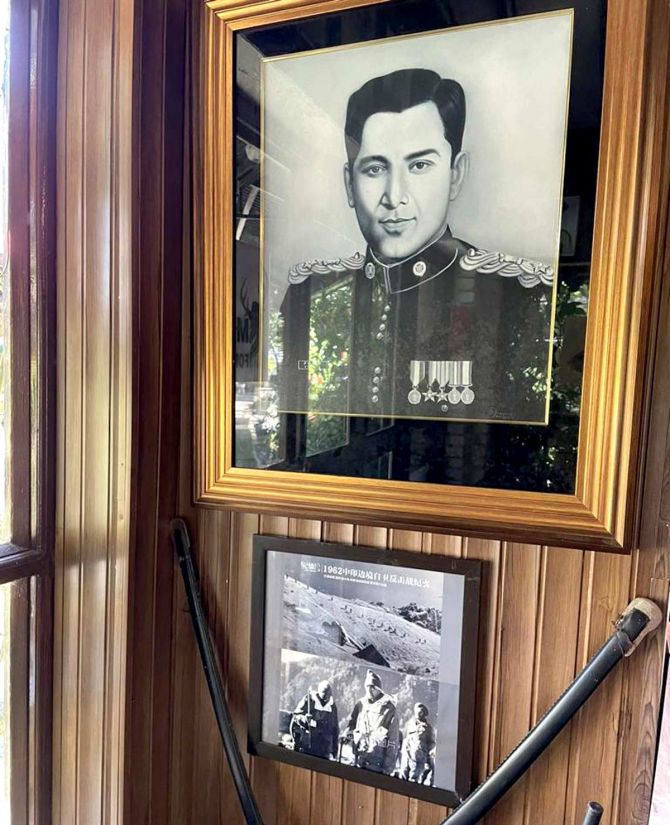
Army Headquarters, responsible for the mistakes which Brigadier Dalvi said were due to a 'faulty higher direction of war', instead blamed him for handing over a brigade to the Chinese on a platter.
"On his return from the PoW camp, his own government thought he had been brainwashed and was a traitor. That pricked him deeply. He was a proud man," says Michael Dalvi, who has remained in touch with the fauj that his father so loved. Every year, he invites cadets of the Indian Military Academy in Dehradun to conduct their annual horse Hack (horse) race on his estate in the forest.
The cadets then join him for breakfast.
"When he went to Pandit Nehru to tell him that his troops and officers fought so well and none of them have got recognised, Panditji told him, 'Brigadier, losing armies don't get medals'.
"My dad died that day," says Michael Dalvi, pointing out to the chapter in Brigadier Dalvi's book that shows the valour of Major B K Pant who continued to lead his men disregarding the fatal bullet injuries to the stomach and legs.
'Men of the Rajput Regiment, you were born to die for your country. God has selected this small river for which you must die. Stand up and fight like true Rajputs,' were Major Pant's last words to his men before he sacrificed his life on the battlefield.
Of the 112 men under Major Pant's company, 82 died.
"Major Pant never got a medal," says Michael Dalvi, elucidating the pain that his father felt that his men's valour went unrecognised.
After his return from the PoW camp, Brigadier Dalvi wrote a letter to Major Pant's son telling him what a true warrior his father was.
Last year, Michael Dalvi was waiting for an eye check-up in the reception of a hospital in Dehradun when fate brought along an unexpected surprise.
The person sitting beside him happened to ask him his name. When Michael Dalvi told him so, the man stood up from his seat.
"He was Major Pant's younger brother, a retired colonel from the Assam Rifles! We hugged each other, played the Assam Rifles song on our mobile phone and I spoke to Major Pant's son on the phone. It was fate that brought us together," says Michael Dalvi.
Subsequently, Major Pant's son sent him photographs and a copy of Brigadier John Dalvi's handwritten letter about his father's bravery.
The letter and photographs are among the war memorabilia in Michael Dalvi's resort.
Major Pant's son and grandson both went on to join the army. His grandson was commissioned in 2014.
"This is the ethos of fauj!" says Michael Dalvi. "This is what makes our fauj what it is."
Feature Presentation: Aslam Hunani/Rediff.com

